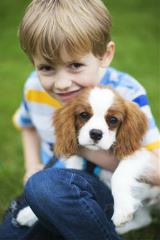Benefits of Pet Ownership for Kids with Autism

Dr. Gretchen Carlisle, research fellow at the University Of Missouri College Of Veterinary Medicine, has released two important studies that focus on animals and children affected by autism.
The first study, as reported in the Journal of Pediatric Nursing, was dedicated to the decision-making steps of animal ownership for parents of children with autism.
Survey Focus
The study surveyed 70 families with children of autism between the ages of 8 and 18, and focused on the parents’ decision-making process of bringing a dog into their family.
- Parents interviewed claimed their decision to get a dog was influenced by their previous experience with dogs.
- Parents also noted their decision to get a dog was influenced by their perceived belief that having a dog in the family would provide a benefit to the child with autism.
Findings of Survey
The outcome of the study showed that when a dog was brought into the family:
- Children and dogs interacted with one another
- Children and dogs formed a bond with one another
- Dogs provided companionship
- Dogs acted as a form of stress relief
- Dogs provided opportunities for the child to better learn responsibilities
Point to Consider
Carlisle sees a companionship benefit between dogs and children with autism, but notes that:
- The choice to bring a dog into a home should be well thought out
- Children with autism who are easily agitated or who have noise sensitivities may experience difficulties with dogs that are active or that bark
- Consideration needs to be given to the type of animal being brought into the home
While this particular study only addressed dog ownership, Carlisle recognizes that there are other pets that may be a better choice for some families.
Additional Research
Further research by Carlisle, as reported through the Journal of Autism and Developmental Disorders, concentrated on the connection between pets and the social skills of children with autism.
Findings of Survey
This investigation found that children with autism that lived in pet households:
- Showed increased abilities in the types of social skills that are typically difficult
- Were more likely to be assertive and engage in social behaviors such as introducing themselves, asking for information, and responding to questions
Carlisle explained that when children with autism have difficulty interacting with others, a dog can help overcome this difficulty by opening an opportunity for the child to invite peers to play with the dog. The dog then serves as a bridge to aid communication between children with autism and their peers.
The finding of Carlisle’s research provides a deeper understanding of the ways that companion animals help improve human lives.
Call your Covetrus Representative at 855.724.3461 to learn more benefits to share about pet ownership with your clients.
Careers
Are you looking for a place to let your talents shine? At Covetrus, we help our practitioner customers better serve their patients and take pride in providing the best customer experience possible. Search our open positions to see our available opportunities.
Newsletter
Stay current with what’s going on with Covetrus, subscribe to receive our newsletter and email communications. Subscribers will receive the latest information in practice management, sales and marketing, animal health, and more.


Leave a comment